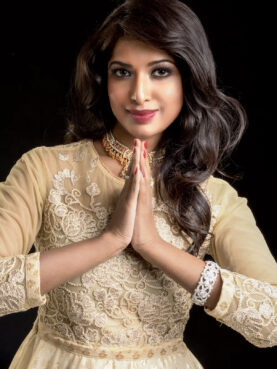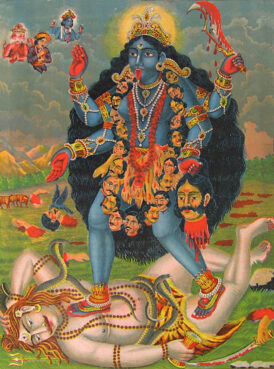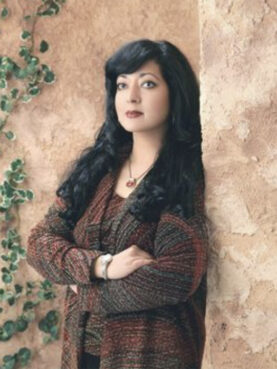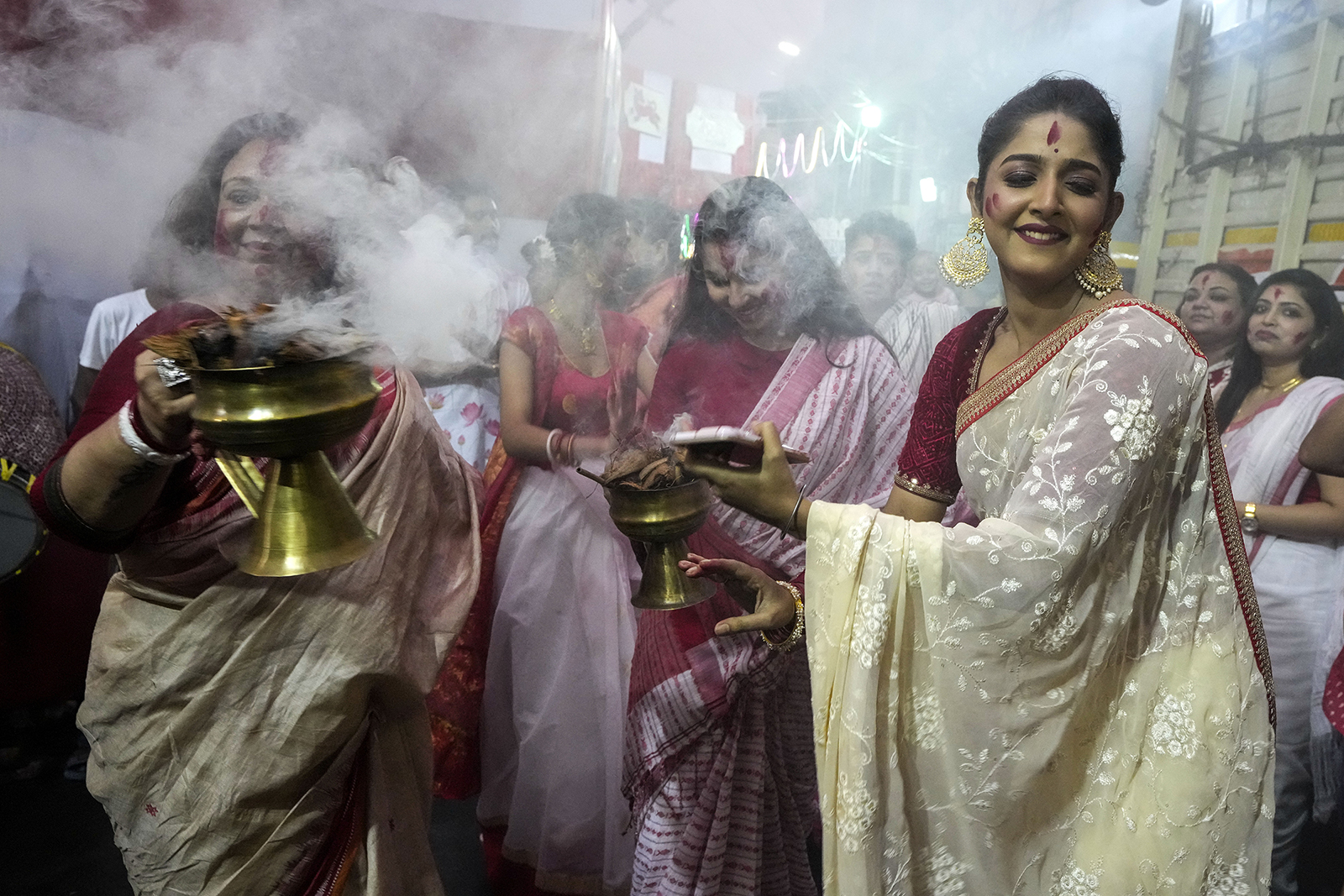Many point to Shakti, the divine feminine energy, as an antidote to toxic masculinity.
(RNS) — Preity Upala has lived more than a few lives. After a career as an investment banker in Australia, Upala moved to the U.S. to pursue her dream of attending film school, eventually landing roles in major Bollywood films like “Bahubali” and in the Hollywood production “Sex and the City 2.” Now, in Los Angeles, Upala is a film producer and podcast host. And if her resume is not varied enough, Upala is also considered a global strategist, called upon by news organizations worldwide for her expertise in international diplomacy and foreign policy.
But Upala, who is Hindu, sees these multiple pursuits as compatible, inspired by the many facets of the divine feminine in her tradition.
“The goddess worship is so prevalent in our culture,” said the Dubai-born Upala, “but the goddess has many faces. There are many goddesses. It’s not just the devout wife or devotee, it is the fierce Kali or the Saraswati, who is all about knowledge.”
In common, she says, all goddesses and women hold a part of Shakti, the “primordial cosmic energy” who is the personification of the divine feminine. Shakti is also the female counterpart to Lord Shiva, both of whom together represent the balanced feminine and masculine energy in each being.

“That Shakti, the life force, moves through us and it shows itself in different forms,” said Upala. “In my own life, I’ve seen different facets of the Shakti energy work through me.”
Many Hindu women, like Upala, look to the ancient scriptures for guidance on modern feminism.
“The beauty with Shakti is, she doesn’t need to give herself up in order to fight for space,” said Upala. “She holds her own, she knows her place, and no one’s gonna take that away from her. Her job is just to shine and be glorious.”
The power of femininity has been prevalent in Hindu philosophy since the emergence of what is said to be the very first scripture, the Rig Veda. Many Hindus see Shakti as the force from which the universe came, like a mother who births her children.

Divine feminine energy as Shakti flows through all of the female goddesses, explains Hindu theologian Rita Sherma. From Kali, the force destroying evil, or Durga, the warrior who maintains balance, to Annapurna, the divinity of food and nourishment, the goddesses in Hinduism are just as dynamic and multifaceted as women themselves, says Sherma.
“The fact is, the feminine divine in Hinduism explodes every single gender binary trope people can think of,” said Sherma, who teaches women’s studies and religion at the Graduate Theological Union in Berkeley, California. “It is the aggressive, assertive, explosive principle of becoming. All manifestation, all actualization of divine potential explodes through the feminine divine.
“So she’s, you know, not your Stepford wife,” adds Sherma.
And what’s more, Sherma says, most commonly known gods, such as Lord Ram and Lord Krishna, are worshipped alongside their respective female consorts, Sita and Radha. Without the feminine, she says, masculine energies would be in “chaos.”
“The masculine and the feminine are both within us,” she said. “The two are complementary binaries.
“The feminine divine is certainly dynamic and creative, even in gentle-appearing feminine divine like Radha,” added Sherma. “It’s her that the world emanates from, it’s through her the world is redeemed. Through her, Krishna experiences joy and bliss.”
Like Upala, Sherma felt unsatisfied in her previous career in business and made a shift later in her life, with two children, crediting Shakti as the guiding force who led her through her new path.
“It was feminine power all the way,” she said.

Sherma became fascinated with Mahadevi: the all-encompassing female deity who is the counterpart to the god Deva and is the subject of the “submerged” and “forgotten” scripture, the Devi Mahatmya. The scripture, which tells various myths centered on the goddess and other goddesses, is often buried under the rest of the vast library of Hindu texts, she says, and should be reclaimed as a resource for women today, especially after the “400,000 years” that women have spent “apologizing for their empowerment.”
“Many women in villages, especially elderly women, who may not even be literate, became respected reciters of the text,” said Sherma. “They had a great deal of power, and both women and men would come to them for their blessing. And sometimes they would experience the presence of the divine feminine within them. And they would then be worshipped as Shakti.”
Shakti Redding, a yogi and mystic psychologist at the Soul Artist Academy in Vail, Colorado, said she found her true calling after being introduced to the Devi Mahatmya and Tantra, the esoteric Hindu and Buddhist philosophy. Born as Rachel to a Christian family, Redding felt a shift when she moved to the nature-abundant Colorado. “I felt just a charge of energy, almost like, ‘Where have you been all my life?,’” she said, attributing that charge to Shakti.
“I really had been drawn this detailed picture of a masculine father God, and so archetypically when I felt God or thought about God, it was as this father spirit,” she said. “But when I was in nature, there was something more, something more feminine, something more kindred in that sense of femininity, and the wildness of it.”
After a childhood of practicing yoga in church basements with her mother, Redding never expected she would found her own yoga academy, or change her name to Shakti, the one first given to her by yogis at the Naropa University in Boulder, Colorado.
But her understanding of the dharmic feminine divine, the mother-goddess of nature, has helped her through the most difficult moments in her life, including a terminated pregnancy at a young age. Worshipping Shakti helped her come out of her grief, and her shame, she said.
“As women, we carry a lot of wounding and a lot of scars and a lot of tender suffering,” she said. “And we also hold the potential for immense forgiveness and reconciliation.”
“How important it is to remember we are all part of the whole,” she added. “We are the daughters, the sisters, the mothers, the lovers. May our stories equip us with the courage, compassion to lead the world awake to a love beyond all opposites.”
The traditional dance of Shiva and Shakti together, called Tandava, said Redding, represents the delicate balance of feminine and masculine in life itself. The root of many of the world’s issues, she said, is a lack of understanding between different or opposing energies. “In the end,” she said, “Shiva and Shakti, the infinite potential and the creative power, are aspects of the same reality.

“Once you understand this in depth, this balance becomes applicable to the healing of cultures,” she said. “Healing the wounds, the political divide, the gender divide.”
Upala agrees and insists it is time for everyone, including men, to fall back to their roots, rather than “toxic” versions of masculinity and femininity she says are common in Western frameworks. And respect for Hindu goddesses, she said, doesn’t always translate to respect for all women.
Upala believes the world’s Hindu women are on the precipice of an awakening. “I think we’re only just beginning to find our dharmic voice,” she said. “It is coming at a time when the world needs it the most.”
“We have to really hold our own in a time and a space where the world is throwing back at you what they think feminism, beauty and power should be,” she said. “We don’t have to learn or relearn anything. The knowledge is actually in us. And it is for us to enjoy, celebrate and actually share that to the world.”
